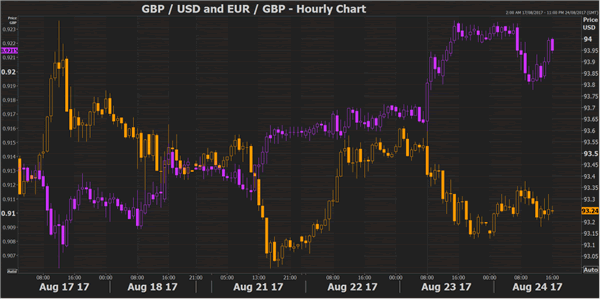Today marks a year how the UK Prime Minister gave a speech about Brexit in a Conservative conference and said that "We are not leaving only to return to the jurisdiction of the European Court of Justice – that’s not going to happen". Yesterday, though, while May reiterated her view on Britain’s own legal path, a Brexit paper on "enforcement and dispute resolution" submitted by the state’s secretary David Davis expressed a different opinion. Following the report, which revealed that contradictions between May and her team remain, and today’s disappointing evidence on migration, the pound touched new lows against its major counterparts.
The UK’s legal positions were put on paper on Wednesday for the first time since the divorce vote in 2016. A few hours later after May reiterated that only the UK and not the ECJ would have the right to decide on the country’s legal matters after Brexit. In contrast to May’s remarks, the paper which was characterized as "constructive" stated several ways in which the ECJ’s permissions would be needed even after the "direct jurisdiction" transitory period (probably three years after divorce) would end. Papers were also published on security and citizen’s rights, as well as on a future customs agreement, which is the most important to businesses. The UK government is proposing a "freest and most frictionless possible trade in goods between the UK and the EU". The paper admitted that if the UK refuses to accept EU legal judgment, it will face difficulties to reach a trade agreement with the block. Although the paper did not mention which trade model the UK is heading towards, countries such as Iceland, Liechtenstein, and Norway which operate under ECJ’s independent European Free Trade Association court (EFTA), follow ECJ’s rules on the single market. The justice minister, Dominic Raab, also argued that the country has to keep "half an eye" on EU legislations as future trade disputes could emerge.
Meanwhile, second estimates of GDP growth figures for the second quarter, published during early European trading hours, showed that the UK economic environment remains fragile. Despite GDP growth rate remaining unrevised at 0.3% q/q and at 1.7% y/y, consumer spending and business investments did not contribute to the country’s economic expansion. Household spending rose by 0.1% y/y, the weakest rate posted since 2014, while business spending recorded a 0% growth. Exports and imports increased by 0.7%, while government spending improved by the same amount.
Another report out of the UK showed that net migration has dropped to the lowest level in three years. The Migration Minister, Brandon Lewis, considered this fall as "encouraging", though the head of employment at the CBI, Mathew Percival, claimed that the increasing number of EU departures might lead to skill shortages in the labor market. Based on the statistics, more than half of the fall in net migration was attributed to a decrease of 51,000 EU citizens, the lowest reduction since December 2013.
With political risks heightening and Brexit talks weighing significantly on domestic economic performance, the odds for a rate hike anytime soon are diminishing.
Looking at the reaction in the forex markets, the pound reached a 2-month low of $1.2777 yesterday, while on Thursday cable was trading higher at 1.2810. Euro/pound jumped to a 10 ½ -month high at 0.9235 on Wednesday and pulled back to 0.9207 today. Pound/yen dropped to more than 2-month low of 139.29. Against a trade-weighted basket of currencies, the pound index tumbled to 74.60, its lowest level since November 2016.

